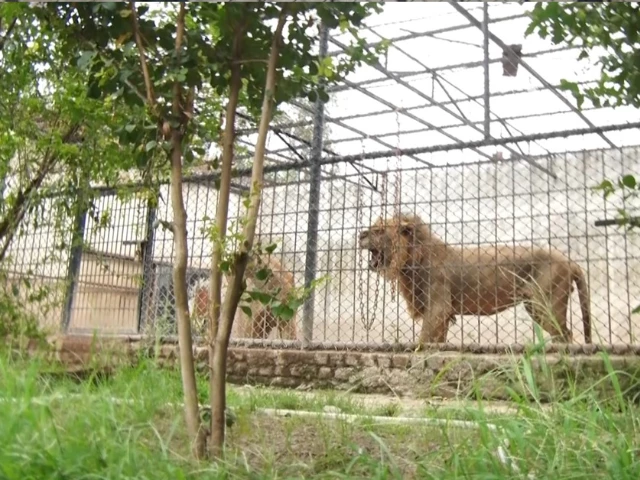Private reproduction facilities in cities are closing after the decision of the Punjab Cabinet, the 2025 decision, which prohibits lions, tigers, leopards and jaguars in urban residential areas.
Until now, 27 big cats have been arrested in the custody of the Department of Silvestre.
The authorities say that taking the measure is necessary for public safety and animal welfare, in line with international standards.
The Government must regulate and market the sector instead of imposing a general prohibition, the farm owners argued.
“The breeders were not consulted during policy formulation,” said Mian Umar Dola, owner of a farm that has been raising large cats for 17 years and operates an installation in the lahore sabzazar area.
Read: The laws of the law are fine to protect the big cats
A lion remained in a cage in private facilities in Lahore before the Punjab prohibition of large cats in urban areas. Photo: Express
“Keeping lions in small houses or in the roofs is insecure, but owners with sufficient space and security measures must afford,” he said.
“Great carnivores can be housed in the heart of the city, so private breeders should also be allowed in strict conditions.”
“Despite two decades of breeding of great cats in Pakistan, there have been no human victims,” Dola said.
LPG cylinders and dog bites kill people every year, but none is prohibited, he added.
According to him, Pakistan occupies second or third place worldwide in the raven of large cats, the country could generate currencies through exports with the support of the government.
The lionesses sometimes reject their puppies, which forces breeders to feed them by hand to guarantee survival, he added.
Zoologicals also raise puppies in milk and artificial foods, but it is about crime when private breeders do the same, he said to the farm owner.
Read more: Punjab to prohibit sale and start sterilization of large private property cats
He suggested that up to six months puppies should be legally allowed in private care.
Additional head of Punjab Syed Kamran Bukhari said that the property and breeding of large wild animals must follow the standards of the World Association of Zoos and Aquariums (Waza).
According to these guidelines, the new policy requires that the farms are registered only if they meet the standards for the size of the land, the dimensions of the enclosure, the security protocols and must be outside the urban settlements.
Government zoos provide open enclosures, three levels and veterinary facilities, almost impossible conditions for private facilities, he said.
Only the federal government has authority to allow animal exports, Bukhari said.
According to Waza standards, large cat cabinets must have at least 12 feet high, or 16 feet if they do not have a protective wiring or a cantilever.
A two -meter gap between animals and the public is mandatory, along with shaded areas, scratch structures and interior shelters for climate or extreme disease.
Double door and trained personnel systems are also required.
These measures are designed to guarantee public safety and preserve the natural behaviors of animals.
Animal rights groups have also expressed concern.

A lion remained in a cage in private facilities in Lahore before the Punjab prohibition of large cats in urban areas. Photo: Express
“Confine lions and tigers to small cages causes physical and psychological damage,” said annexed activist Khan Umrzai.
Also read: Punjab Hogar of 587 Large Cats of Private Property
“Small reproduction farms cannot provide adequate space or veterinary attention, endangering animals survival.”
Organizations such as animal protection and Waza emphasize natural habitats instead of promoting commercial captivity, said animal rights lawyer, Izzat Fatima.
Lions and tigers born in captivity cannot be released in nature.
These facilities must be limited to research and education purposes.
The Punjab government maintains its decision reflects security and compliance concerns of international standards.
Breeders continue to ask for regulated permits and animal welfare groups insist on strict limitations to safeguard the big cats.




